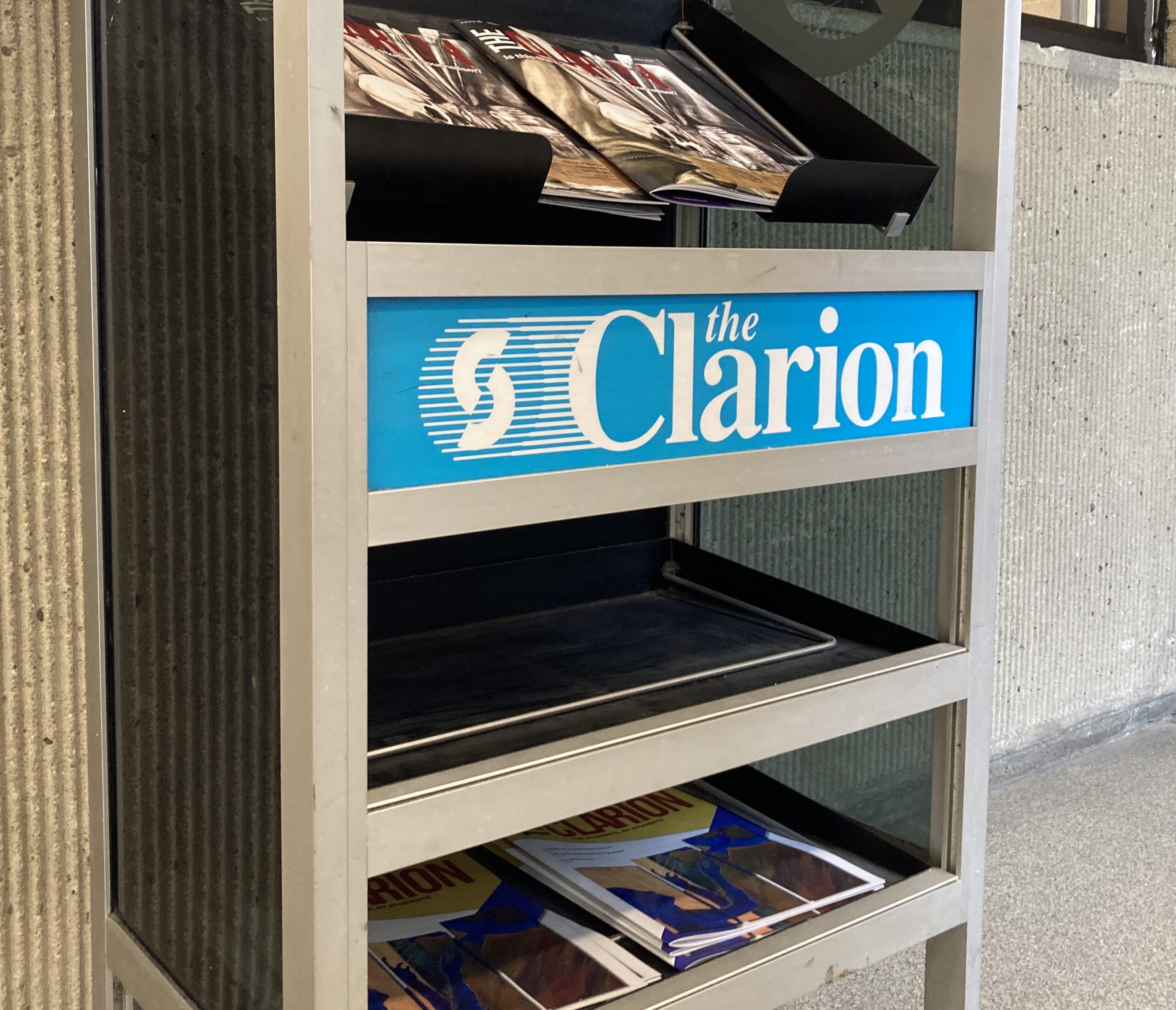Coinciding with national Student Press Freedom Day, The Clarion organized a bake sale in the library’s loggia. This year the big day was held under the slogan ‘Powerfully persistent.’ It is with that in mind that we reflect on the importance of and challenges facing student journalism on our campus.
The financial suplex we’ve endured is first in line. To spare you the minutiae of Sinclair’s byzantine workings, the promise of thousands of dollars in funding has gone ‘poof’ a la Houdini. Hence the table in the loggia and the ‘whopping’ $65 we made that day. Our community, it seems, does not know exactly what’s at stake.
Importance of Being Earnest
Some time ago I interviewed Dr. Mary Ramey and Kevin Kelly of the Dayton Peace Museum about the importance of journalism. The story was inspired by a roadblock one of my reporters faced when writing about the ongoing conflict between Palestine and Israel. She’d been told, on calling a particular office on campus, that the article was a bad idea that would ‘disturb the calm of foreign students.’
As ludicrous as I and our good friends at the Peace Museum found the notion, without a student press that silence would reign supreme. Journalism is ultimately about truth and its absence is nothing short of terrifying.
“Without truth we can’t trust and trust is the basis for all relationships. That’s true not only between you and I but with society writ large. Society is just a larger pool of relationships and trust is what allows a relationship to cohere,” Dr. Ramey said.
Kelly added, “The media has this giant amplifier and has a responsibility to amplify all stories, all persuasions and not just what’s popular, or gets the most hits, or what the mainstream feels is most important.”
Few people in Dayton know this better than Kelly, who opened an exhibit in the museum about the war in Laos. A neighbor of Vietnam, many Americans are unaware of the so-called ‘Secret War’ waged by Kissinger and others. Little to nothing was reported. In media blackholes, finding out about horrific events after the fact is all too common.
Reporters don’t have the privilege of looking away. When they do or when they can’t get the job done, tragedy happens and goes unreported. Journalism, at its heart is about truth. There is a moral and ethical obligation on the part of the journalist to their readers. Without it there is only dystopia.
“Without facts and science and things that are verified and sincere, no one will know what the truth is and everyone will just make up their own version of it because it will benefit them in some way,” said Kelly.
Dr. Ramey added, “Media, especially journalism as the first draft of history, have a real responsibility to ferret out the truth but then present it without editorializing and that is difficult to do.”
Especially when faced with staunch resistance, lack of cooperation, and a financial axe whirling over your head.
The Future
On the subject of student journalism, David Bodary, Chair of Communications at Sinclair, certainly agrees. In a recent episode of The Clarion Chats podcast, he highlighted just how vital reporting is.
“The idea that we’ve got three branches of government: legislative, judicial, and executive branches. But the fourth estate are the journalists. Because in a democracy that freedom of expression and opportunity to gain information is important. And through students we learn things,” he said.
People terrified of what might happen if ‘mozlam’ students answer questions about the Middle East, for example, learn they need not be afraid. The reality of literal information black holes is not the stuff of sci-fi or fever dreams but a reality facing communities in the US.
“Talk about dystopian, it’s happening across the country and even cities that are losing their local papers. Then how do you as citizens know what’s going on in your local community? How do you hold the school board accountable, or the county board or commission? If you don’t have those local journalists how do you maintain the sharing of information?” said Bodary.
But on the subject of The Clarion’s potential demise, Bodary was not as concrete. In fact, after the podcast, you could hear the collective dusting of CVs in the office. One poor bloke even added ‘potential Turkish housewife’ to his resume.
David said, “I think the college is always challenged to figure out how to support things that are important to the college and if we look around at some of the schools locally, we see that they’re making choice, they’re making changes, based on what they can afford to do and how they feel their institution best fits their role in the community. Sinclair has been committed to this in the 30 years I’ve been here, and I don’t see that changing while I’m here.”
Which brings me to the bake sale on Feb. 22 and our efforts to bring you high quality news. The end may not come today or tomorrow or even in the next few years. But anytime journalists have to all but schill for their bread, things are not looking good. So, how ‘bout a cookie?
Ismael David Mujahid, Executive Editor

